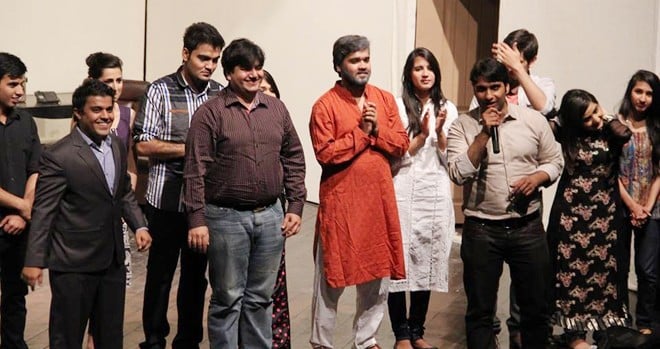

Alhamra Cultural Complex has for long provided the introductory stage for aspiring actors. The most recent instance of an amateur production to be staged there was titled Twinkle Twinkle Main Bangaya Star (TTMBS). An Urdu Musical, the play was a collaborative effort of Zavia Productions and the Gurmani Centre for Languages and Literature at LUMS, both of which share the aim of promoting Urdu language in general and theatre in particular.
The production team, headed by Umer Hameed, aimed to stage "an original Urdu Musical having… Pakistani flare of humour, dreams, romance and imagination with thought provoking solutions… to social issues."
Alas, this particular theatrical endeavour failed to deliver on its much-advertised slogan.
Scripted and directed by LUMS student Shariq Thara, the play depicts the conflict between the aspirations a middle-class man has for his son and the interests of the young man in question. The protagonist Harris Ghaznavi, played by the director himself, is faced with the dilemma of turning his passion for acting into a career without upsetting his conservative father.
Mr Shoaib Ghaznavi (Ali Ansari) is a chartered accountant by profession with a staunch belief that the entertainment industry is the worst possible career choice for anyone. Harris’s subsequent efforts to pursue a career in the world of theatre while fooling his father are aided by his younger sister Suhana Ghaznavi ( Zahra Rao) and the bumbling man-servant Kochi Koo (Ahmed Naveed). Harris’s hesitation in confiding in his father is compounded by the all-suffering, resigned personality of his mother Shaista Ghaznavi (Ayesha J. Khan).
Lending further complication to the story is the sub-plot concerning Harris’s love life. As in a Bollywood movie, there is the best friend (read ‘true love’), Jannat (Kiran Rehman) and a plethora of women vying for Harris’s attention.
Bollywood, and the clichés it generally propagates, seems to have been the major inspiration for the cast and crew of TTMBS.
The play strikes you as a cross between Aamir Khan’s critically acclaimed 3 Idiots and Shahrukh Khan’s blockbuster Main Hoon Na what with its themes of the artist struggling to overcome familial disapproval without being disrespectful to his parents and the unrecognised love interest in the form of the sincere best friend respectively.
But while the afore-mentioned movies do justice to their central plots, the play suffers from the addition of a play-within-a-play. To help Harris get back into the home he has been kicked out of and win his father’s approval, the plan hatched by his friends unfolds in the form of a play named ‘Mission Tamasha,’ with Acts announced in asides by Kochi Koo. This stylistic technique unfortunately only detracts from the story and simply lengthens the play without being able to hold the audience’s interest.
The production’s lack of cohesion is further fueled by the random insertion of synchronised group dances on famous Bollywood numbers that do not really jive with the storyline.
Instead of pulling the multiple themes of the story together through the use of songs and dances, the musical aspect of TTMBS entraps the play more deeply into a Bollywood-inspired identity. The utilisation of, mostly Shahrukh Khan’s, popular songs does nothing to lessen the plot’s dependence on dialogues. From the dance sequence that forms the play’s opening act to the last dance number, every song is placed in the context of the play that Harris is practising for.
To be fair, the choreography by Aleena Iqtidar, who also plays herself in the play, was very well-directed. The dance crew’s synchronised moves also testify to the long hours the cast and crew must have put into the theatrical venture. The solo dance performance by Muhammad Azeem on ‘Meray dholna sun,’ though misplaced and completely irrelevant to the story, was the highlight of the play.
The use of strobe lights and a smoke screen was sadly insufficient to mask the reality that it was an amateur production with a cast and crew comprised mainly of college students. The team’s desire to break the stereotypes of the dictatorial father, the unassertive house-wife and the obedient son forced to suppress his artistic inclinations is commendable. But their lack of experience appears to have been their biggest weakness.
In an effort to portray the negative implications of unquestioned convictions, the team of TTMBS has itself resorted to the use of artistic clichés. With the exception of Ali Ansari as Shoaib Ghaznavi, the cast did not manage to inhabit their characters successfully.
With more exposure and the opportunity to act in theatrical ventures, the young actors will hopefully be able to overcome the perceived stereotypes of the characters they portray.
The absence of a sizeable audience, particularly serious viewers, must have been disheartening to this group of novice actors. The fact that the audience hooted and whistled every time the female dancers came on stage further undermined the team’s effort to produce "quality Urdu theatre".
Though this comedy of errors was unable to deliver the brilliance it proclaimed in its glossy brochure, it just might produce Pakistan’s next big dancing star.